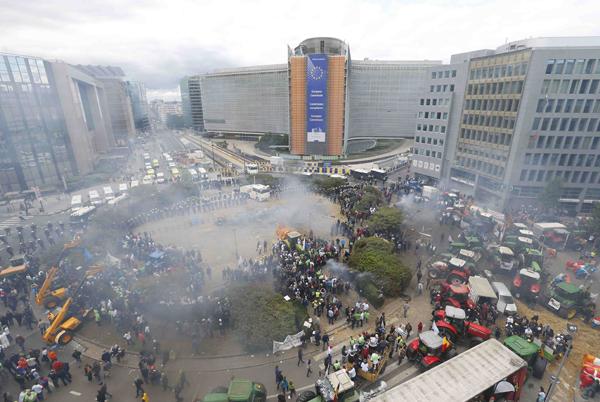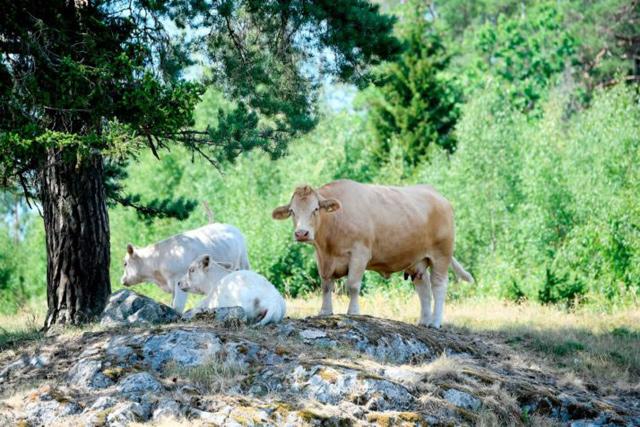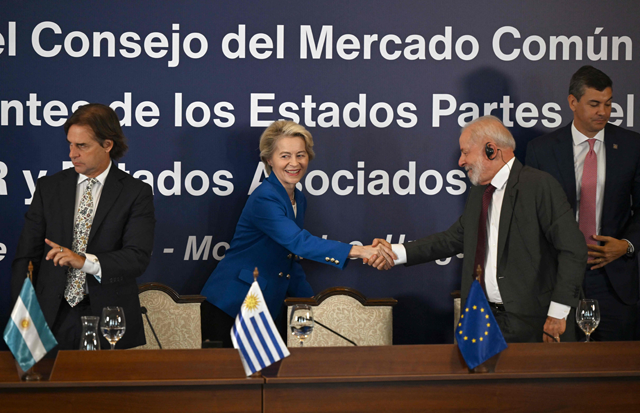You are here
EU to give 500m euros to farmers hit by Russia sanctions
By Reuters - Sep 07,2015 - Last updated at Sep 07,2015

A general view shows the Robert Schumann Square during clashes between Belgian riot police officers and protesters on Monday (Reuters photo)
BRUSSELS — The European Commission announced a 500 million euro ($557 million) package of measures on Monday to provide relief for farmers stung by slumping prices, triggered partly by the loss of exports to Russia due to European Union (EU) sanctions against the country.
The crisis has triggered a wave of protests which culminated on Monday with nearly 5,000 farmers and more than 1,000 tractors arriving in Brussels, where an emergency meeting of the EU's Agriculture Council was being held.
"This package will allow for 500 million euros of EU funds to be used for the benefit of farmers immediately. This is a robust and decisive response," European Commission Vice-President Jyrki Katainen said.
The package was discussed by the EU's Agriculture Council, which consists of farm ministers from member states, on Monday. Some details have not yet been finalised.
"We are pleased with the initial reactions [from ministers]," commission spokesman Daniel Rosario said.
The European Commission, the EU executive, said it was seeking to help farmers with cash-flow difficulties, stabilise markets and improve the functioning of the supply chain.
The plan allows member states to advance some payments to farmers and the commission said it was working closely with the European Investment Bank to design financial instruments where repayments were linked to commodity prices.
Albert Jan Maat, president of farmers group Copa, said Russia was one of the EU's main markets and sanctions imposed as part of the dispute over Ukraine last year had led to the loss of about 5.5 billion euros of agri-food exports.
"This situation is not our fault yet it is our sector that is being hit the most. EU farmers are paying the price for international politics," he added.
Farmers have been facing a worsening cash flow crisis.
"We are now in early September, bills have not been paid for the summer and a lot of milk producers will not be able to see their way through the winter unless cash is put on the table immediately," Mansel Raymond, dairy chairman at Copa said.
Milk prices paid to EU farmers are down 20 per cent from last year at 30 euro cents a litre on average. In the Baltic States, which has been worst hit by Russian sanctions, prices are even lower at around 20 euro cents.
The commission said it had not yet finalised the national distribution of the support funds but there would be "particular regard to those member states which have been most affected by market developments”.
The EU executive refused to raise the intervention price for dairy products, a move sought by farming groups and supported by France, Italy, Spain and Portugal.
Much of the funds come from larger-than-expected receipts from a dairy super-levy imposed on those who exceed their quotas under a system which was abolished earlier this year.
The super-levy raised more than 800 million euros while only 440 million euros was included in the EU budget, creating additional funds to distribute.
The commission also said it would be proposing a new private storage scheme for pigmeat, an increased budget for promoting products in 2016 and added it was also working hard on bi-lateral trade agreements, most recently with Canada and Vietnam.
Related Articles
PARIS — "Our cows have been living off hay cut in June, there isn't any grass," says Jean-Guillaume Hannequin, a farmer in eastern France, w
BRUSSELS, Belgium — The EU on Monday launched a WTO challenge against a Chinese anti-subsidy investigation into imports of European dairy pr
BRUSSELS, Belgium — Germany and Spain hailed the conclusion Friday of a controversial free-trade deal between the European Union and South A













